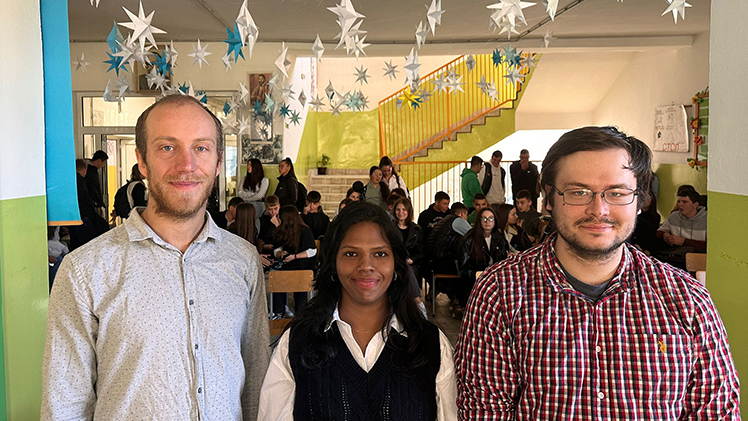The global demand for clean energy and sustainable water solutions continues to rise, making international collaboration in these fields more important than ever. Two researchers from The University of Toledo have taken this challenge head-on through the “Renewable Energy and Water for the US and Serbia” project, funded by the U.S. Department of State.
Tyler Brau, a Ph.D. candidate in physics, and Dr. Sanduni Premathilaka, who recently earned her Ph.D. in chemistry, traveled to Serbia in October to collaborate with researchers on the development of renewable energy solutions and water sustainability initiatives.

Tyler Brau, right, a Ph.D. candidate in physics, and Dr. Sanduni Premathilaka, who recently earned her Ph.D. in chemistry, traveled to Serbia in October to collaborate with researchers including Dr. Nikola Ilic (left) on the development of renewable energy solutions and water sustainability initiatives.
“My advisor, Dr. Randy Ellingson, a professor in the Department of Physics and Astronomy and PVIC Endowed Chair, informed me about the project when it was in the planning phase, and I saw it as a great opportunity to engage with researchers abroad,” Brau said.
For Premathilaka, the opportunity came through her advisor, Dr. Dragan Isailovic, a professor in the Department of Chemistry and Biochemistry.
“I was excited to join the project as it allowed me to collaborate internationally and deepen my understanding of renewable energy and water purification,” she said.
Isailovic highlighted the significance of Sanduni’s contributions: “Since joining UToledo in the fall of 2019, Sanduni has been focused on research related to the identification and quantification of toxic peptides, microcystins, which are produced during harmful cyanobacterial blooms in Lake Erie,” he said. “In the project with the scientists from Serbia, she educated others not only about her research but also about some of the water pollution and sustainability issues that are encountered throughout the world.
“One of the goals of this collaborative project is to raise awareness about renewable energy and water sustainability. I am glad that Sanduni and Tyler successfully collaborated on fulfilling this goal with the help and generous hospitality of the scientists, teachers and students from the scientific institutions and schools in Serbia.”
The project provided a platform for both researchers to focus on unique areas of study. Brau worked closely with Serbian collaborators Dr. Ivana Validzic and Dr. Nikola Ilic from Vinča Nuclear Research Institute in Belgrade, Serbia, on the synthesis of antimony sulfide nanoparticles and the fabrication of thin films via spray deposition. The samples they developed in Serbia were later transported back to UToledo for advanced photoluminescence characterization, helping to uncover how different dopants impact charge carrier recombination pathways in solar cell materials.
Beyond laboratory research, Brau and Premathilaka were actively involved in community outreach, engaging with Serbian schools to promote STEM education. Alongside their Serbian colleagues, they delivered lectures on renewable energy, climate change and water sustainability to students and scientists at the University of Belgrade and Vinča Institute as well as in three schools: Vuk Karadžić Elementary School in the village of Blaževo, Brus High School and Elementary School Jovan Jovanović Zmaj in Brus.
Premathilaka also discussed harmful cyanobacterial blooms and arsenic pollution, highlighting their impact on drinking water in certain Serbian regions.
“We had the unique opportunity to share knowledge about solar energy and water pollution and purification with young students, which was incredibly rewarding,” Brau said. “Explaining complex scientific concepts in an accessible way helped us refine our own understanding as well.”
Premathilaka added: “Visiting research laboratories in Serbia provided valuable insights into how different institutions approach water purification challenges. It was a great chance to exchange ideas and methodologies.”
Both researchers credit their time at UToledo for preparing them for this international collaboration.
“The experience I gained at Wright Center for Photovoltaics Innovation and Commercialization (PVIC) in photovoltaics and material characterization was instrumental in my work abroad,” Brau said, while Premathilaka added: “UToledo provided me with research opportunities and mentoring experiences that helped me build the skills necessary for this project.”
Ellingson also praised Brau’s involvement in the project.
“As a physics graduate student focused primarily on the science and optical characterization of photovoltaic (PV) solar cells and solar cell materials, I am proud that Tyler has embraced this opportunity to broaden his experience and perspective regarding the global societal landscape for PV and other renewable energy technologies. Working to understand how solar energy can play a bigger role globally in electrical power generation — with Serbia as one example — has deepened Tyler’s appreciation for how his collaborative scientific research can bring significant impact through higher performance and lower-cost PV energy conversion.”
The success of their work in Serbia was made possible by the support of multiple mentors.
“Dr. Nikola Ilic played a crucial role in guiding us through Serbian culture and assisting with research accommodations,” Brau said. Premathilaka also expressed gratitude to Dr. Ivana Validzic for organizing visits to various research institutions and to Dr. Isailovic and Dr. Ellingson for their mentorship and guidance.
For students interested in international research opportunities, both researchers emphasize the value of embracing new experiences.
“Take the time to immerse yourself in the local culture; it can give you a fresh perspective on research and problem-solving,” Brau said. Premathilaka added, “Stepping outside your comfort zone can lead to unexpected professional and personal growth.”
Their work exemplifies how international collaboration can drive progress in renewable energy and water sustainability while also fostering cross-cultural connections. As the world looks toward more sustainable solutions, partnerships like these highlight the critical role of academic research in addressing global challenges.
For more information on renewable energy research opportunities at UToledo, visit the PVIC website.